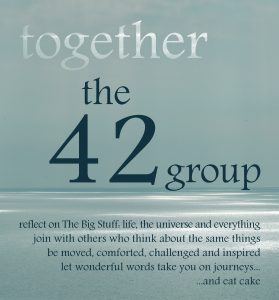 ‘… and then you’d think aha! something interesting is going to happen and then someone would mention Derrida and it would all be over…’
‘… and then you’d think aha! something interesting is going to happen and then someone would mention Derrida and it would all be over…’
Thus my friend Simon, speaking about his time reading English at Oxford and the death-by-theory thing which can so often happen during formal study. I know what he means. In my very first group supervision at Cambridge we were issued copies of a poem—I have repressed the knowledge of what it was, if I ever knew—and the Director of Studies’ opening gambit was ‘So, what do people make of the lacuna?’. That really opened things up, as you can imagine. Me-then was daunted into a silence full of the knowledge of my own inadequacy; me-now feels sad about the merely intellectual engagement with poetry. But these days I’m delighted to be in position to work with poetry and people in a way that I feel matters, and thing 30 is my celebration of this.
Every month I facilitate two different groups where we read together. At each, people bring poems they’ve thought of in relation to a particular topic (which we’ll have chosen together); and at each, the emphasis is on responding to the poems in whatever ways come naturally to you. It’s not that people who come aren’t informed about matters poetical—some are, and some aren’t so much—but that being informed isn’t important or even, really, the point. Instead it’s about enjoying, sharing, responding: having a relationship with the poems and with each other, and being emancipated from the tyranny of Having to Know. These are places to wonder.
Which isn’t to say that that it’s irrelevant that we’re reading poetry (as opposed to fiction, newspapers or whatever). It does matter, because the rhythms and images and modes of poetry can bring Heineken moments in the way that prose might not. At one of the first What Are Words Worth? groups I was reading some of the classic poems people often come across when they are little—’the Highwayman’, ‘the Owl and the Pussycat’, that sort of thing—and someone who rarely talks since he suffered a stroke suddenly sat forward in his chair and said, quite distinctly, ‘I learned that one at school’. His spouse and carer was astonished. Given that the WAWW groups are funded by the Wordsworth Trust, with the remit of “reaching” members of the public, particularly those who might be marginalised or isolated in some way, that was definitely a case of the brief being met. It was an extraordinary and beautiful moment.
 But as well as such miracles of connection, I want to give thanks for other gifts the groups have brought me. At early WAWW meetings I used to have the standard-issue ex-teacher’s fear about [not] having enough material, so would toil into town under a rucksack distended by approx. one third of my entire collection of poetry books (and friends, that’s quite a few). But I have learned that I can rely on the group: even if I’m the backstop, I’m not on my own with a responsibility. Learning to trust the group-members, and receive their trust without turning it into some kind of imperative, has been a precious experience. This is a co-creation. It works because we all want it to, and we do it together. So I carry fewer books.
But as well as such miracles of connection, I want to give thanks for other gifts the groups have brought me. At early WAWW meetings I used to have the standard-issue ex-teacher’s fear about [not] having enough material, so would toil into town under a rucksack distended by approx. one third of my entire collection of poetry books (and friends, that’s quite a few). But I have learned that I can rely on the group: even if I’m the backstop, I’m not on my own with a responsibility. Learning to trust the group-members, and receive their trust without turning it into some kind of imperative, has been a precious experience. This is a co-creation. It works because we all want it to, and we do it together. So I carry fewer books.
Unlike WAWW, the 42 group was a lone venture, and felt altogether riskier. I remember the evening I tentatively explained the idea to Celia (whose en-couragement and enthusiasm were, from the first, more valuable than I can say). Recklessly swigging Pinot Grigio—I even had a second glass—I described what I imagined: a group where the exploration of poetry was a way into the exploration of our own lives and experience: a community of people who wanted to think, and talk, and feel, together. I had no idea if it would work. Would other people get that it wasn’t poetry appreciation, or therapy, or a support group, but something a bit (only a bit) like all of those things?
It’s taken a couple of years for the 42 to settle—another lesson in trust, for me—but I can now feel that people are more confident with the poems and each other. Enough of us will turn up. Something valuable will happen. Some bonding experiences have helped—as when the lights were flickering so fit-inducingly that we had to switch them off and read in darkness punctuated only by the light of each other’s phone torches and a table lamp hastily fetched by someone who lived nearby; or when the community theatre group was rehearsing their Christmas production in the room next door and our quiet, tender moments of intimacy and exploration were punctuated with enthusiastic and a-tuneful novelty versions of carols…
 We know each other, too: which former teacher can be deployed to create quiet amongst the noisy kickboxing children in the hall; who’ll bring the Mary Oliver, who the Leonard Cohen; who will be in search of A Definitive Answer; who will challenge with such an absence of malice that no offence can possibly be taken, and who will be ready with the emollient and empathic word… What I’m saying is: it’s a community. For me it feels like a heterogeneous found family where care and respect coexist with honesty. Thus while I often come away with new insights into poems, and having met new poets and texts, I also come away nourished by the sheer fact of people being there, being themselves. Someone who recently joined told me he felt like it was a place he’d feel safe enough to cry. That is a wonder-ful thing. I leave those Wednesday evenings feeling lifted, and extremely fortunate.
We know each other, too: which former teacher can be deployed to create quiet amongst the noisy kickboxing children in the hall; who’ll bring the Mary Oliver, who the Leonard Cohen; who will be in search of A Definitive Answer; who will challenge with such an absence of malice that no offence can possibly be taken, and who will be ready with the emollient and empathic word… What I’m saying is: it’s a community. For me it feels like a heterogeneous found family where care and respect coexist with honesty. Thus while I often come away with new insights into poems, and having met new poets and texts, I also come away nourished by the sheer fact of people being there, being themselves. Someone who recently joined told me he felt like it was a place he’d feel safe enough to cry. That is a wonder-ful thing. I leave those Wednesday evenings feeling lifted, and extremely fortunate.
In ‘The Peace of Wild Things’ (read it here) Wendell Berry describes the (temporary) respite he finds when he lies down ‘where the wood drake rests in his beauty in the water’. One 42 group member said, last month, ‘But—we are the wood drake’. Others agreed. There followed a brief but (for me) joy-inducing discussion of how the 42 is a place to turn aside, to rest in beauty—of poems and feelings and connection—and feel replenished thereby. People really value this double accompaniment offered by peers and poetry. I feel simultaneously so proud of what I’ve done, and so humbled by what everyone else has done, too.
So in those moments when I doubt my own value in the world, and feel the ache of my childlessness, I remember that this is one of the things I have brought into being. The 42 group isn’t me, or even mostly me, but in conceiving it and making it a reality I have done something which matters—which makes a difference in people’s lives, on however small a scale. As I write I’m feeling all British and harrumph-y about “blowing my own trumpet”, but I’m also feeling a lump in my throat. I do feel proud as well as grateful. Knowing I facilitate this reading together helps me feel better about myself and about the world.
‘People have been through everything before us,’ Libby Purves once said, ‘and some, by great grace, have recorded it with undying power… [poetry offers us] handrails and lifelines and emergency lanterns… [reassuring] us that others walked this hard trail and lived to express it’. Yes, yes, yes. Though this is in danger of sounding like something even the Carpenters might have blue-pencilled for excess cheesiness, it’s true: through these poetry groups we do share the laughter and the tears. We read, and know we are not alone.
And that’s a hell of a lot more important than knowing what a lacuna is.

For more on poetry holding your hand in the dark places, have a look here.
Beautiful, Lucy. I can’t come next week and am gutted! I sent your Advent Calendar to my friend who lives near Boulder, Colorado, high up in the Rocky Mountains. She lost her husband suddenly and inexplicably last month, whilst he was working in Tokyo and she had to return a week later with his ashes…. She and I are opening the poems one a day and both finding it very therapeutic. She is using the first one for a poetry group she runs. She’s an existential psychotherapist and journal therapist so you and she have a lot in common. Hope to see you at choir! Liz x
Oh Liz, how wonderful to know that the 42 group is reaching so far afield! We have another member in Canada, who contributed a poem for the WTAK anthology, too. Heineken moments all over the place…
And yes, sounds like I might get on well with your friend. An e-meeting some day, perhaps?! X
An insightful and thoughtful post. I love this idea of poetry bringing comfort and a group that explores this (with cake!)
I’m so glad you find it inspiring. Thank you. Cake just helps most things, doesn’t it?! And yes, poetry sits with me in some of the worst places. And some of the best. This year we have made a 42 group advent calendar with a poem for every day leading up to Christmas. I just love the idea that we are all reading it together, if separately. The thought warms me… X
I am not even going to google ‘lacuna’! Useful words this week as I attempt to moderate the contents of my rucksack for the retreat!
Well I’ll just say I hope there are no lacunae in your luggage!! Hope the retreat goes wonderfully well X
Hi Lucy, thank you for the mention!! – this is such a wonderful snapshot of the work you do, as well as the amazing community that has grown out of this! I’m seeing a recipe for a Utopian society right here…
Hey Simon, you are welcome! Your mum commented within about 2 minutes so she must have seen it too. Twas but truth you spoke… x
Wonderful words Lucy and what a blessing your group must be to so many people. I have read your words over and over but taken my time because my eyesight is fading. Thank you for your blog. It gives me much thought and comfort.
That is the very best possible news I could have about it. Thank you. I write to know I’m not alone, too! x
Ah, Lucy, I am so grateful for that day when, laying the fire and scrumpling newspaper, I came across the article about your course about exploring grief at the Wordsworth Trust. And that led to the 42 Group which is so very special.
For many years I had entertained the idea of setting up a spiritual book group, but with what life has thrown in my path have never had the energy. I feel that the exploration of poetry says things without need to discuss them, and what discussion we have is the more succinct, because of the direct nature of the poem. And much is understood without words.
Thank you so very much…
What you say about succinctness is spot on. Thank you for putting that so well, and for – well, for being you, and being in the 42 group. I feel your support and your valuing, and they are so precious xx